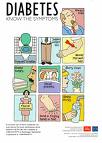
| Ever wondered who gets diabetes? It can be anyone and everyone and it can occur anywhere in the world. There are several factors that may give rise to diabetes. Knowing the possible factors as well who is in the high risks group will allow a person to be more informed and offer him the opportunity to take preventive actions before the disease strikes. This article examines those common factors that give rise to diabetes and the people most likely to become diabetic. Firstly, you should be aware that diabetes is not contagious. So if you come across a diabetic person, do not fear that he will pass the disease to you. This cannot happen. Secondly, there are 2 types of diabetes, Type-1 and Type-2. Type-1 diabetes is caused when the body no longer produces insulin. It usually affects children and young adults. To manage type-1 diabetes, regular insulin injections have to be taken. However, this article focuses on Type-2 diabetes and looks at those factors that cause it. Age is one factor is look at. It was reported that a person who is more than 40 years old is at risk of getting diabetes. Also, the older a person is, the more likelihood of getting diabetes is greater. Its been reported that as one ages, our body cells are not as efficient as before when we are younger. This may result in slower breakdown of the food consumed into energy. The end result is that there will be high glucose in our blood since it is not being made use of by the body cells to convert into energy. The risk of getting diabetes increases when a person is overweight. According to an article, Weight-control Information Network.” Do You Know The Health Risks Of Being Overweight?. Nov. 2004. U.S. Dept. of Health and Human Services. 23 Oct 2006, the cells in the body become less sensitive to the insulin when a person is overweight. It added that if a person has more fat cells than muscle cells, then the insulin becomes less effective overall, and glucose remains circulating in the blood instead of being taken in to the cells to be used as energy. A contributing factor is if that person does not do any exercise. This will increase that person’s risk of getting diabetes. By exercising, it will help to lower the blood glucose level in the body. Another benefit is that the person can control his weight when doing exercises. Overall, having a regular exercise routine will be beneficial. The risk factor increases further should there be a family history of diabetes. Just like me, both my parents are diabetic, and so are my maternal grandparents. Now, I am diabetic. It goes to show that when there is a genetic history of diabetes in the family, one must start from young to manage the disease, even before it strikes a person. If I had known what I know now, I would have been more careful with my health. By TYC |











